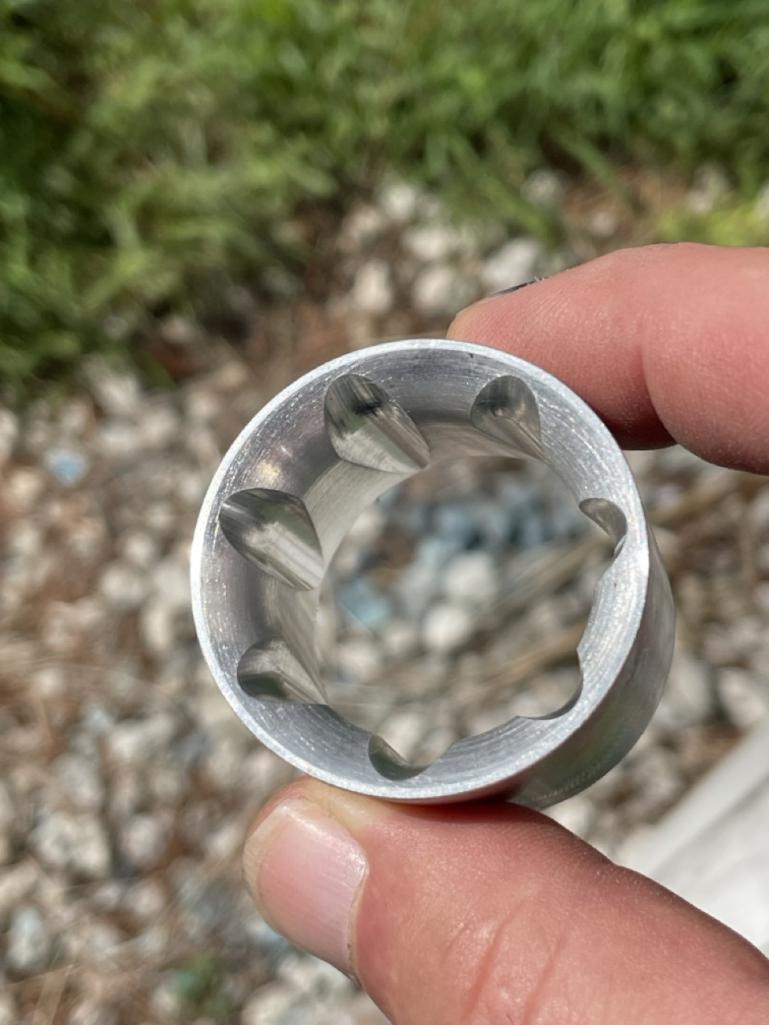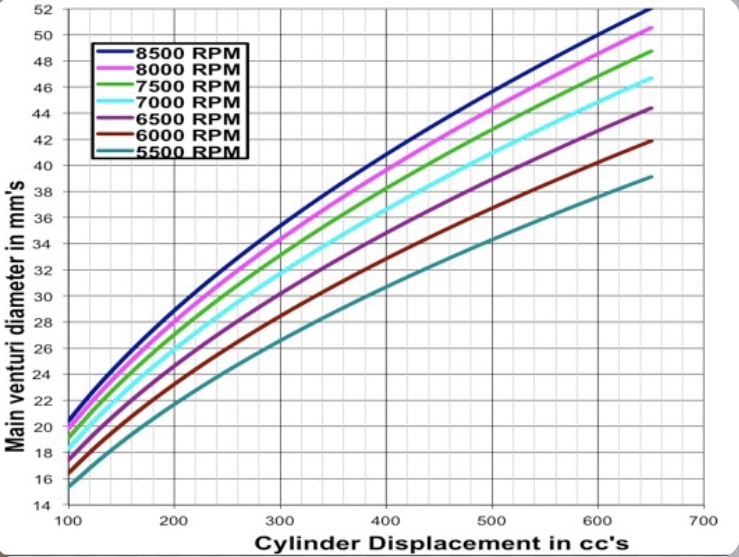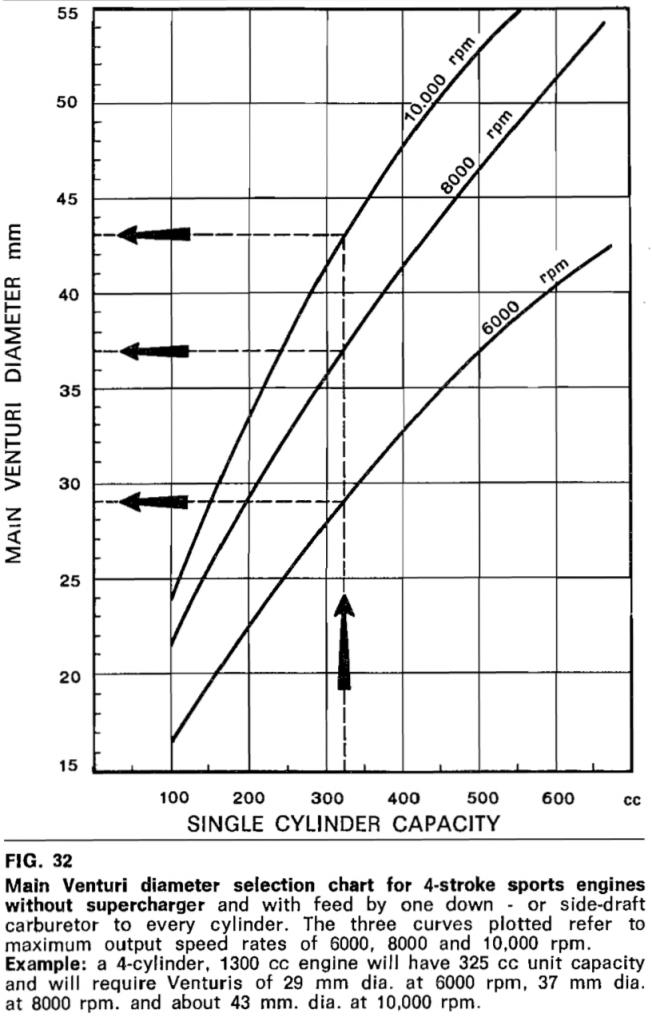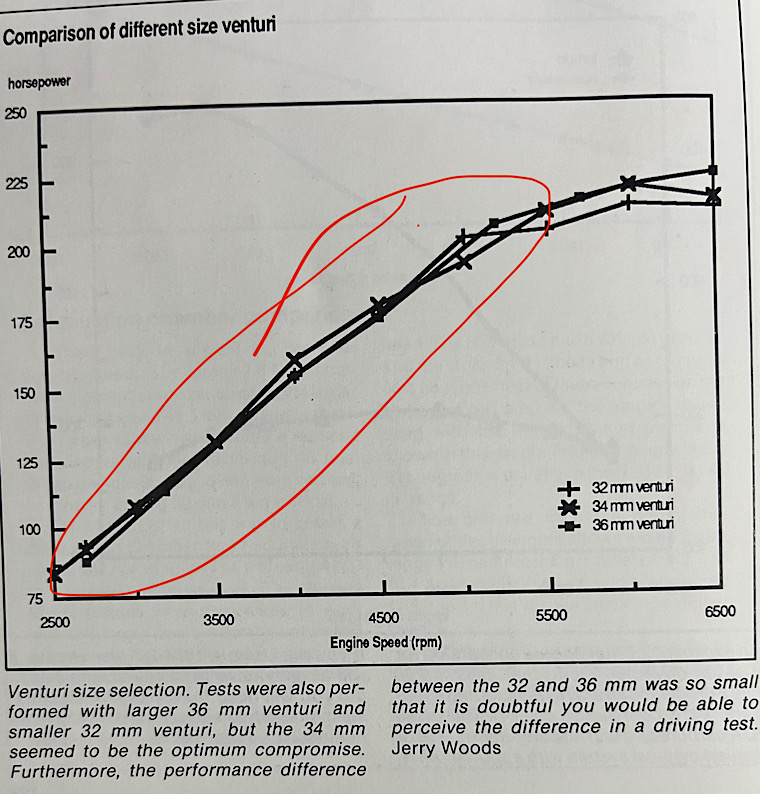|
|

|
Porsche, and the Porsche crest are registered trademarks of Dr. Ing. h.c. F. Porsche AG.
This site is not affiliated with Porsche in any way. Its only purpose is to provide an online forum for car enthusiasts. All other trademarks are property of their respective owners. |
|
|
  |
| Chad911sc |
 Sep 11 2025, 09:18 AM Sep 11 2025, 09:18 AM
Post
#1
|
|
Member   Group: Members Posts: 178 Joined: 24-September 24 From: Florida Member No.: 28,374 Region Association: South East States |
So I finally finished every aspect of my restoration and I’m on the final step before really being able to break my new 2056 in. I have the idle circuit close enough to where it needs to be with idle jets of 50. My problem is my transition from idle circuit to the main circuit. I had purchased a set of Gene Berg venturis that were a 30 idle circuit and then with wide open throttle they would increase the flow to 34. I thought this would be good with better flow at the top due to the web cam (86a) which is supposed to be more mid and top range power. I have ported 2.0 heads and 96mm pistons and cylinders. It also has the 123 distributor set on setting #3. The timing is set at 5 degrees base timing and 28 degrees total.
The problem is that if I even try to open the throttle more than an inch or so, the AFR gauge slams over to 16 or higher. So I’ve only driven it a few times after adjustments, and it does the same thing everytime. I took out the fancy dual plain Venturis and put in a set of stock functioning 30 vents and just took it for another spin. It does the same thing with the 30s. Current set up: ET F11 Idle 50 Mains 130 AC 180 Vents 30 My float level is set at 10.5 with the gasket. I’m at sea level in Florida. As long as I just ride the pedal gently, the AFR stays in the 12-14 range all the way up to 4000 rpm. It idles at 10.5-11.5. The carbs have been rebuilt and are synced and balanced. I am ordering a set of AC and mains so I can adjust further as needed. Should I try to go down on the air correction jet first to fatten it up on the top? Or maybe something different with the float height to provide more fuel in the bowl? Thanks in advance for all your advice. Can’t wait to be able to run this thing!! Attached thumbnail(s) 
|
| densible1 |
 Sep 11 2025, 12:01 PM Sep 11 2025, 12:01 PM
Post
#2
|
|
Newbie  Group: Members Posts: 42 Joined: 5-April 22 From: Hermosa Beach Member No.: 26,444 Region Association: Southern California |
I'm also at sea level with my 2270 (2256) build utilizing 96mm cylinders/pistons. I'm using 44's idf because of the longer stroke. After much trial and error I ended up with this configuration which keeps air between 11.5-14 bout 12 at idle .
Vents=36 AC=200 Mains=135 idle=55 Also 123 is 5-7 dynamic advance but up 32 advance starting at or above 4000rpm. Throttle response is smooth throat power band. Perhaps ending up with 36vents could mean that a vent bout 8mm smaller than the idf size might be a good guide. Mark |
| densible1 |
 Sep 11 2025, 12:04 PM Sep 11 2025, 12:04 PM
Post
#3
|
|
Newbie  Group: Members Posts: 42 Joined: 5-April 22 From: Hermosa Beach Member No.: 26,444 Region Association: Southern California |
Wait, correction I meant 5-7 static advance on the bluetooth 123
|
| Chad911sc |
 Sep 11 2025, 01:13 PM Sep 11 2025, 01:13 PM
Post
#4
|
|
Member   Group: Members Posts: 178 Joined: 24-September 24 From: Florida Member No.: 28,374 Region Association: South East States |
After re-reading my post I forgot to add that the fuel system is all new and I have 3lbs of fuel pressure at the carbs.
|
| Superhawk996 |
 Sep 11 2025, 01:52 PM Sep 11 2025, 01:52 PM
Post
#5
|
|
914 Guru      Group: Members Posts: 7,382 Joined: 25-August 18 From: Woods of N. Idaho Member No.: 22,428 Region Association: Galt's Gulch 
|
How about some homework?
Suggest you read this thread. Take note Brent was at about 6000 feet but the tuning principles are the same. Just know you’ll run slightly richer jetting at sea level. I’m going to put forth the following proposition: unless you really want the absolute last 5% or so of top end horsepower and are willing to trade driveability for it - 28mm venturis may serve you better. http://www.914world.com/bbs2/index.php?showtopic=359926 Hint: IDF’s are running on the idle circuit far more than you think - especially at the part throttle transition you’re having problems with. Interesting fact: you can drive the car pretty well at partial throttle, on level ground with the mains and emulsion tubes removed. (Don’t do this in rush hour traffic (IMG:style_emoticons/default/laugh.gif)) Read the section on the idle circuit and transition ports. page 10. https://www.lainefamily.com/images/WeberTuningManual.pdf |
| Chad911sc |
 Sep 11 2025, 02:16 PM Sep 11 2025, 02:16 PM
Post
#6
|
|
Member   Group: Members Posts: 178 Joined: 24-September 24 From: Florida Member No.: 28,374 Region Association: South East States |
I still have a set of 28 vents, so that is an option.
I will read the posts that you have provided and see if I’m missing something. |
| Chad911sc |
 Sep 11 2025, 05:22 PM Sep 11 2025, 05:22 PM
Post
#7
|
|
Member   Group: Members Posts: 178 Joined: 24-September 24 From: Florida Member No.: 28,374 Region Association: South East States |
So after reading the material you sent me, I thought it would be a good idea to check where all my screw settings were adjusted. I read the CB performance low circuit running and it took me step by step through the tuning process again. The steps that I followed the first time were very similar, but not exact. After following their method, the engine sounds like an angry bee when I rev it. Wow what a difference. The AFR at idle is now 12.5 fairly steady and hums at 850-900 idle speed. Starts very easily now as well.
I will take if for a spin tomorrow and report back any issues. |
| Superhawk996 |
 Sep 11 2025, 08:07 PM Sep 11 2025, 08:07 PM
Post
#8
|
|
914 Guru      Group: Members Posts: 7,382 Joined: 25-August 18 From: Woods of N. Idaho Member No.: 22,428 Region Association: Galt's Gulch 
|
|
| 930cabman |
 Sep 12 2025, 04:59 AM Sep 12 2025, 04:59 AM
Post
#9
|
|
Advanced Member     Group: Members Posts: 4,256 Joined: 12-November 20 From: Buffalo Member No.: 24,877 Region Association: North East States 
|
So after reading the material you sent me, I thought it would be a good idea to check where all my screw settings were adjusted. I read the CB performance low circuit running and it took me step by step through the tuning process again. The steps that I followed the first time were very similar, but not exact. After following their method, the engine sounds like an angry bee when I rev it. Wow what a difference. The AFR at idle is now 12.5 fairly steady and hums at 850-900 idle speed. Starts very easily now as well. I will take if for a spin tomorrow and report back any issues. Webers can be tricky, but when dialed in they sing glad you got them happy |
| Chad911sc |
 Sep 12 2025, 10:55 AM Sep 12 2025, 10:55 AM
Post
#10
|
|
Member   Group: Members Posts: 178 Joined: 24-September 24 From: Florida Member No.: 28,374 Region Association: South East States |
After the test drive today, it is tuned better than before, but still leaning out if I try to push anything into the throttle. If I drive it with a very gentle pedal, it stays in AFR 12/14. Anything else than light pedal it falls on its face and leans out to 16 or higher, but I don’t obviously stay in it.
The idle screws are right at a half inch in after making contact. The mixture screws are anywhere from 1.5-2.2 turns out. It is leaning out with any type of pedal, so does this mean that I need to go with a 55 idle jet instead of the 50 I have now? I don’t have any, so I will have to order a set if you guys think this is the first step. |
| Superhawk996 |
 Sep 12 2025, 02:20 PM Sep 12 2025, 02:20 PM
Post
#11
|
|
914 Guru      Group: Members Posts: 7,382 Joined: 25-August 18 From: Woods of N. Idaho Member No.: 22,428 Region Association: Galt's Gulch 
|
I’d normally say increase the idle jet since you are turned out so far on the needles. Really you don’t want to be out 2 turns. That is a sign the jet isn’t big enough.
But . . . It is also a sign of not having enough vacuum signal on the idle and transition ports which aligns to you inability to feed it throttle other than slowly leaning into the pedal. So . . . Since you have the 28 Venturis and don’t have bigger idle jets - put the 28 Venturis in It may very well solve your problem At a minimum it will give you information and a data point regarding how the larger Venturis are affecting your part throttle transition and whether it is a vacuum signal problem, a jet problem, or perhaps a little of each. |
| Chad911sc |
 Sep 12 2025, 03:44 PM Sep 12 2025, 03:44 PM
Post
#12
|
|
Member   Group: Members Posts: 178 Joined: 24-September 24 From: Florida Member No.: 28,374 Region Association: South East States |
Perfect…
Excellent idea. I will change those out in the am and see what results I get. There is so much information out there that contradicts itself. So many ways to tune and get to the desired results. I have read so many posts that lean towards the 28 vents on a 2056. Then the people who make the parts (Webber), say that I should be running a 32 vent with cam and heads. So I settled in the middle at 30 after removing the fancy dual plain ones. Will report back tomorrow with the feedback. |
| 930cabman |
 Sep 12 2025, 06:28 PM Sep 12 2025, 06:28 PM
Post
#13
|
|
Advanced Member     Group: Members Posts: 4,256 Joined: 12-November 20 From: Buffalo Member No.: 24,877 Region Association: North East States 
|
my experience has been, I get them close (no AFR gauge) and enjoy running them.
I have a sneeze every so often and get 30+ mpg cruising at 80 mph For me, they are close enough sounds like you are close |
| Superhawk996 |
 Sep 12 2025, 06:52 PM Sep 12 2025, 06:52 PM
Post
#14
|
|
914 Guru      Group: Members Posts: 7,382 Joined: 25-August 18 From: Woods of N. Idaho Member No.: 22,428 Region Association: Galt's Gulch 
|
There is so much information out there that contradicts itself. So many ways to tune and get to the desired results. I have read so many posts that lean towards the 28 vents on a 2056. Then the people who make the parts (Webber), say that I should be running a 32 vent with cam and heads. The interesting thing about carbs is there is usually more than one way to achieve an outcome and sometimes one of them will be counter intuitive - like going to a smaller Venturi. Keep in mind that much of the advice you’ll get on carbs is aimed at maximizing horsepower . . . Even if that means diminished drivability. I post this chart often - it’s is a pretty common set of curves that aligns well to recommendations both in the Weber tuning guide as well as several of the published tuning books for Webers and Dellorto’s. The thing is - this chart is for HP. If you use this for tuning street drivability the tuning will suck due to picking a Venturi that is way too large (like 34-36 mm). I know . . . Cause when I was young I thought I wanted to maximize HP. But it turns out - we don’t drive around on the street at redline. Go figure. Took me a lot of years to learn this the hard way.  And here’s the one from the Weber tuning guide  When tuning the first thing to pick is the Venturi - that sort of determines everything else. And if the Venturi is too large, you don’t get a good vacuum signal and everything else sort of goes to (IMG:style_emoticons/default/stromberg.gif) As a generalization: People over-carburate and then wonder why they have poor drivability. I had to learn these lessons myself the hard way. |
| Superhawk996 |
 Sep 12 2025, 07:16 PM Sep 12 2025, 07:16 PM
Post
#15
|
|
914 Guru      Group: Members Posts: 7,382 Joined: 25-August 18 From: Woods of N. Idaho Member No.: 22,428 Region Association: Galt's Gulch 
|
I think it’s probably also worth posting this from the 911 Bruce Anderson book.
If you look at the difference between the 32mm & 36mm Venturi - you’ll see that there is no difference in HP until you get to the very top end. But you can be sure the 32mm will offer far better driveability in day to day, street use.  |
| Superhawk996 |
 Sep 12 2025, 07:22 PM Sep 12 2025, 07:22 PM
Post
#16
|
|
914 Guru      Group: Members Posts: 7,382 Joined: 25-August 18 From: Woods of N. Idaho Member No.: 22,428 Region Association: Galt's Gulch 
|
And one last item food for thought.
The Zenith 40 TIN carbs used on 2.2L 911T have 27.5mm Venturis 2.2L / 6 cylinders is 366cc per cylinder Now go look at that first chart I gave you - it would suggest a much larger venturi. About 33mm for 6500 rpm. Are we to believe Porsche didn’t know how to properly tune carbs? Yes, the reality is people will say that you can get more HP out of that engine by going to Webers and larger Venturi’s - that is true to some extent. But what they never tell you about is the diminished street driveability. There is no free lunch. |
| cgnj |
 Sep 12 2025, 07:27 PM Sep 12 2025, 07:27 PM
Post
#17
|
|
Senior Member    Group: Members Posts: 683 Joined: 6-March 03 From: Medford, NJ Member No.: 403 Region Association: None 
|
I am a Dellorto fan boy. Bought my first set in the early 80's when CB first started importing them. I have had cars that had Webers go thru my hands, I could never tune them as well as the Dellortos.
I found a set of 40's in a box and am planning to rebuild them and use them for engine break-in. I found this channel on Youtube while looking for Weber rebuild and tuning vids.DailydrivenVWbug. He runs a 68 Beetle with a 2056 Type 4 engine. Tests lots of Performance upgrades for both Webers and Dellortos, Demonstrates how to solder your jets and drill them to the size you need. I wish I knew this info when I was tuning my Dells on the 2270. I spent hundreds on jets and vents. Should have bought jet gauges and drills, which I own now. |
| porschetub |
 Sep 12 2025, 07:53 PM Sep 12 2025, 07:53 PM
Post
#18
|
|
Advanced Member     Group: Members Posts: 4,922 Joined: 25-July 15 From: New Zealand Member No.: 18,995 Region Association: None |
Perfect… Excellent idea. I will change those out in the am and see what results I get. There is so much information out there that contradicts itself. So many ways to tune and get to the desired results. I have read so many posts that lean towards the 28 vents on a 2056. Then the people who make the parts (Webber), say that I should be running a 32 vent with cam and heads. So I settled in the middle at 30 after removing the fancy dual plain ones. Will report back tomorrow with the feedback. Hawk said it all about fuel mixture screws they must be set right spec and even before doing carb vacuum balancing ,28 mm vents are the best for Weber /Dellorto ,great transition and good response off idle due to improved vacuum signal and again as he mentioned you can most likely use existing jets . You could pull your fuel pressure back a bit too 2.5 psi is fine or a bit less. Good luck ,think you will be closer to the "sweet spot"soon. |
| brant |
 Sep 12 2025, 08:24 PM Sep 12 2025, 08:24 PM
Post
#19
|
|
914 Wizard           Group: Members Posts: 12,051 Joined: 30-December 02 From: Colorado Member No.: 47 Region Association: Rocky Mountains 

|
I run big venturis on the race car for 8000 redline.
Had to build a 10k transmission to make them work. Keeping the gearing just right you can avoid the low rpm stumbles if you exit every corner (the lowest rpm point) at 5000 rpm. For a street car 28 vents are great and give you the velocity you need for below 5k |
  |
2 User(s) are reading this topic (2 Guests and 0 Anonymous Users)
0 Members:

|
Lo-Fi Version | Time is now: 13th September 2025 - 12:53 AM |
Invision Power Board
v9.1.4 © 2025 IPS, Inc.









